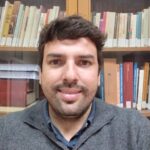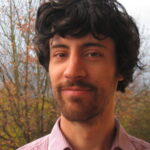OUR TEAM

Martin Biersack
Principal Investigator
Martin Biersack is Principal Investigator of SUSPICIO. His main research interests are the differentiation and categorization of humans, Renaissance humanism, and the entangled history approach (cultural transfer, migration, scientific exploration, trade history). He works on the entire early modern period from the late Middle Ages into the nineteenth century, with a territorial focus on Spain and Latin America
In 2009 Martin received his doctoral degree at the University of Regensburg with his dissertation on Spanish Renaissance humanism. From 2013 to 2015 he stayed in Buenos Aires where he worked on the French in the late colonial Rio de la Plata. In 2021 he habilitated at the LMU Munich with a study on the foreigners in the Spanish Empire that was published in 2023 by Campus Verlag (open access link: https://www.campus.de/e-books/wissenschaft/geschichte/geduldete_fremde-17859.html). In 2021 and 2022 he spent one year on an Alexander von Humboldt scholarship at the University Autónoma in Madrid working on a project about scientific expeditions to colonial Spanish America. During the winter term of 2023/24 he was visiting professor at the University of Tübingen. In 2024, together with Eberhard Crailsheim from the CSIC Madrid and Klemens Kaps from Linz University, he published the collective volume Das Amerika-Monopol (https://digital.csic.es/bitstream/10261/354777/1/Das_Amerika-Monopol_book.pdf) on the Spanish-American colonial trad
Investigador distinguido
Universidad de Granada

Vicente Pajuelo Moreno
Postdoc Researcher
Vicente has a PhD in Maritime History and Archaeology from the University of Cadiz and a PhD in Modern History from the University of Lisbon (Extraordinary Prize, 2019/2020). His research focuses on the study of the social, cultural and economic projection of navigation, shipbuilding and underwater heritage during the modern period. He has undetaken research stays in Portugal, Mexico, Colombia and Chile, where he also taught at different universities. Vicente’s publications include the book La Armada de la Guarda. Defensa y naufragio en la Carrera de Indias, CSIC/Universidad de Sevilla (2021); he has also co-edited three books: Dominar los océanos. Ciencia y navegación en los siglos XVI-XVIII, Sílex (2023), Navegaciones en época moderna. Hombres, barcos y naufragios, Doce Calles / Ministerio de Defensa (2024) and Toda la redondeza del mundo. Ciencia y experiencia durante la primera circunnavegación (2025). He was a postdoctoral researcher at the Universidade Nova de Lisboa, 2022–2023; principal researcher of the Project “Los sistemas defensivos del litoral gaditano y su proyección Atlántica (siglos XVI-XVIII),” PR2022-033, at the University of Cadiz, 2024; and is currently at the University of Granada studying the trials conducted during the Mexican Inquisition on those people who might pose a threat to the viceregal administration and the Spanish crown itself.

Richard Herzog
Postdoc Researcher
Richard Herzog received his doctoral degree in History in 2021 at Justus Liebig University Giessen (Germany).His dissertation analyses intellectual, cultural and judicial strategies of assertion and adaptation by the Nahua population from central Mexico at the turn of the 17th century, in a phase in which colonial power structures and demographic crises were massively endangering the continued existence of indigenous lifeworlds. It has been published in open access (wbg Academic/Herder, 2024): https://www.herder.de/wissen/shop/p8/88684-nahua-stimmen-aus-dem-kolonialen-zentralmexiko-ebook-pdf/.
Richard’s analysis encompasses colonial Mexico, Spanish America, global history, transculturality, temporality and dynamics of security. He has undertaken numerous research trips to various archives in Spain, Mexico, Italy and Austria and has held research scholarships at the German Historical Institute in Rome and at the Leibniz-Institute for European History (IEG) in Mainz. From 2021 to 2024 he co-organised a series of transdisciplinary workshops on the Spanish and Ottoman expansions with the IEG, soon to result in an international publication with Amsterdam University Press. Richard is currently a research fellow at the DFG Collaborative Research Centre “Dynamics of Security. Types of Securitization from a Historical Perspective” at Philipps University Marburg and is supervising the database “Dynastic marriage contracts of the early modern period (1500 – 1800)”. Lately, he has been working on the ways in which the colonial powers in central Mexico progressively questioned and then no longer acknowledged and applied Nahua inheritance rights tied to matrilineality, which attributed a central role to elite women as a source of noble dynasties and in the distribution of titles and land ownership.

Beatriz García-Torres Robles
Predoc Researcher
Beatriz is a graduate in History from the University of Granada. In addition to her Master’s in Secondary School Education, she obtained her Master’s in History in 2024 through the Europe to America. Societies, Powers, Cultures (Eurame) postgraduate program. During her graduate and postgraduate studies she was the beneficiary of several research grants, including the Universidad de Granada-Banco Santander research initiation grant for master’s students of the University of Granada. She has published articles in Spanish journals dedicated mainly to the history of the Jesuits in Granada and its province. Beatriz joined SUSPICIO in March 2025 and is currently working on her PhD project, focusing her research on the Spanish American purification courts (Tribunales de purificación).

Iván Antonio Haro Palma
Predoc Researcher
Iván is a graduate in History from the University of Granada. In his academic work, he focused on topics related to the modern history of the Kingdom of Granada, mainly in social and jurisdictional conflicts, as well as the contemporary history of Spain, particularly in the context of Second Spanish Republic and the Spanish Civil War. Iván joined SUSPICIO in March 2025 and is currently working on his PhD project, focusing on suspicion and juridical conflicts in Cuba at the time of the Atlantic Revolutions.
AFFILIATED SCHOLARS

María Agustina Vaccaroni
Affiliated Scholar
María Agustina Vaccaroni, (Mar del Plata, 1988) is a Professor, BA and MA in History from the National University of Mar del Plata (Argentina). PhD. in History from the National University of Buenos Aires Province’s Centre (Argentina).
She teaches in the Department of Humanities of the National University of the South (Argentina). She is a member of the Research Group in History of America (GIHA-Universidad Nacional de Mar del Plata), of the Total America Project (National University of the South) and of the Foundation for the History of Spain (Argentina). She carried out postdoctoral studies as a fellow of the National Council of Scientific and Technical Research (2021-2024) and at El Colegio de México (August-October 2022).
His doctoral thesis entitled Los primeros policías de la ciudad de Buenos Aires. Funciones, materialidades y territorios (1772-1825)
received the IV Doctoral Research Award in Legal History in Latin America and was published by Tirant Lo Blanch (México) in 2023. She has published papers, books and books chapters in Argentina, Chile, Uruguay, Mexico, Brazil, France and Spain. Her analysis focuses on the changes and permanencies in the notions, practices and institutions of police in Buenos Aires and Mexico City between the end of the eighteenth and early 19th centuries, from the perspective of the social history of police and government. Currently, her research addresses the links between police and punishment, analyzing how the intervention of police authorities in spaces such as prisons, jails and police depots gave rise to punitive practices that combined control, correction and punishment, as police was in charge of the material management of these spaces, where minor crimes were punished without judicial procedure. .